初中英语一般疑问句
初中英语语法一般疑问句3篇
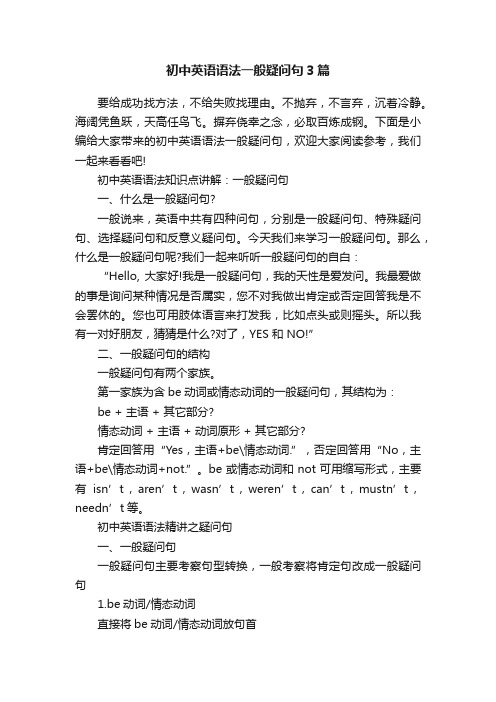
初中英语语法一般疑问句3篇要给成功找方法,不给失败找理由。
不抛弃,不言弃,沉着冷静。
海阔凭鱼跃,天高任鸟飞。
摒弃侥幸之念,必取百炼成钢。
下面是小编给大家带来的初中英语语法一般疑问句,欢迎大家阅读参考,我们一起来看看吧!初中英语语法知识点讲解:一般疑问句一、什么是一般疑问句?一般说来,英语中共有四种问句,分别是一般疑问句、特殊疑问句、选择疑问句和反意义疑问句。
今天我们来学习一般疑问句。
那么,什么是一般疑问句呢?我们一起来听听一般疑问句的自白:“Hello, 大家好!我是一般疑问句,我的天性是爱发问。
我最爱做的事是询问某种情况是否属实,您不对我做出肯定或否定回答我是不会罢休的。
您也可用肢体语言来打发我,比如点头或则摇头。
所以我有一对好朋友,猜猜是什么?对了,YES 和NO!”二、一般疑问句的结构一般疑问句有两个家族。
第一家族为含be动词或情态动词的一般疑问句,其结构为:be + 主语 + 其它部分?情态动词 + 主语 + 动词原形 + 其它部分?肯定回答用“Yes,主语+be\情态动词.”,否定回答用“No,主语+be\情态动词+not.”。
be或情态动词和not可用缩写形式,主要有isn’t,aren’t,wasn’t,weren’t,can’t,mustn’t,needn’t等。
初中英语语法精讲之疑问句一、一般疑问句一般疑问句主要考察句型转换,一般考察将肯定句改成一般疑问句1.be动词/情态动词直接将be动词/情态动词放句首He is a teacher. —— Is he a teacher?He can swim. —— Can he swim?He has finished his homework. ——Has he finished his homework?2.实义动词借助助动词do/does/did根据句子的时态和人称选择适当的助动词,并放在句首,后面的动词要改成原型(如果之前是原型,可不做变化)He walked to school last day.Did he walk to school last day?He walks to school every day.Does he walk to school every day?They play basketabll together every day.Do they play basketball together every day?注意:1.句中涉及some, something, someone 之类的一般要修改成any, anything, anyone等。
初中英语一般疑问句和特殊疑问句

初中英语一般疑问句和特殊疑问句在英语学习中,一般疑问句和特殊疑问句是非常基础且重要的语法点,它们用于不同的交流情境中。
下面我会分别解释这两种句型的构成和使用方法,并提供一些例句。
一般疑问句一般疑问句用于询问事实或情况是否属实,通常期望对方用"Yes"或"No"来回答。
其构成是在陈述句的句首加上助动词、be动词或情态动词,并将句中的动词变回原形(如果有助动词或be动词,则保留原形)。
构成规则:1.如果句子中有be动词(am/is/are/was/were),则将be动词移到句首。
2.如果句子中有情态动词(can/could/may/might/will/would等),则将情态动词移到句首。
3.如果句子中没有上述两种动词,则根据时态选择相应的助动词do/does/did 放在句首。
例句:-陈述句:She is a student.-一般疑问句:Is she a student? (Yes, she is. / No, she isn't.)-陈述句:They can swim well.-一般疑问句:Can they swim well? (Yes, they can. / No, they can't.)-陈述句:You like coffee.-一般疑问句:Do you like coffee? (Yes, I do. / No, I don't.)特殊疑问句特殊疑问句用于询问具体的、特定的信息,句首使用特殊疑问词(what, who, where, when, why, how等)。
特殊疑问句的构成是特殊疑问词+一般疑问句的语序。
构成规则:1.特殊疑问词放在句首。
2.根据需要选择适当的助动词、be动词或情态动词,并调整语序,使其符合疑问句的结构。
例句:-Who is your favorite singer?-Where do you live?-When did you start learning English?-Why are you late today?-How do you usually go to school?通过掌握这些基本规则和例句,你可以更有效地在日常对话中使用一般疑问句和特殊疑问句。
初中英语知识点归纳一般疑问句的变化与回答

初中英语知识点归纳一般疑问句的变化与回答一、一般疑问句的基本结构及变化规则在初中英语学习中,我们经常会遇到一般疑问句。
一般疑问句是用于询问某个陈述句的真实性或确认某个说法的问句形式。
下面我们来归纳一下一般疑问句的基本结构及变化规则。
1. 陈述句结构:主语 + 动词 + 其他成分例如:You like football.中文意思:你喜欢足球。
2. 一般疑问句结构:助动词 + 主语 + 动词 + 其他成分?例如:Do you like football?中文意思:你喜欢足球吗?3. 助动词的变化规则:a. 变为否定疑问句时,助动词用do/does/did,主语要用否定形式。
例如:Don't you like football?中文意思:你不喜欢足球吗?b. 主语为第三人称单数时,助动词用does,其他形式不变。
例如:Does he like football?中文意思:他喜欢足球吗?4. 回答一般疑问句时的基本方式:a. Yes回答:表示肯定回答。
例如:Do you like football? Yes, I do.中文意思:你喜欢足球吗?是的,我喜欢。
b. No回答:表示否定回答。
例如:Do you like football? No, I don't.中文意思:你喜欢足球吗?不,我不喜欢。
二、一般疑问句的特殊情况及回答方式除了基本的一般疑问句结构和变化规则外,还存在一些特殊情况。
下面我们来看一下这些特殊情况及相应的回答方式。
1. 一般疑问句中的特殊疑问词:a. 特殊疑问词一般用来询问某个具体信息,如地点、时间、原因等。
例如:Where does he live?中文意思:他住在哪里?b. 特殊疑问词在一般疑问句中通常出现在句首,然后按照一般疑问句的结构进行变化。
例如:What do you want to eat?中文意思:你想吃什么?2. 含有情态动词的一般疑问句:a. 当一般疑问句中含有情态动词时,将情态动词放在句首,然后按照一般疑问句的结构进行变化。
初中英语一般疑问句和特殊疑问句

初中英语一般疑问句和特殊疑问句一、一般疑问句1. 定义- 一般疑问句是用来询问事物或情况是否属实的句子,通常以助动词(如be动词、do/does、have/has等)或情态动词(如can、may、must等)开头,回答时用yes或no。
2. 结构- be动词(am/is/are/was/were)开头的一般疑问句- 肯定句:He is a student.- 一般疑问句:Is he a student?(将be动词提前,句末加问号)- 回答:Yes, he is. / No, he isn't.- 含有实义动词(do/does/did)的一般疑问句(一般现在时和一般过去时) - 肯定句:She likes apples.(一般现在时,主语是第三人称单数,动词用likes)- 一般疑问句:Does she like apples?(借助助动词does,原动词likes变为原形like)- 回答:Yes, she does. / No, she doesn't.- 肯定句:They played football yesterday.(一般过去时)- 一般疑问句:Did they play football yesterday?(借助助动词did,原动词played变为原形play)- 回答:Yes, they did. / No, they didn't.- 含有情态动词(can/may/must等)的一般疑问句- 肯定句:He can swim.- 一般疑问句:Can he swim?(将情态动词提前)- 回答:Yes, he can. / No, he can't.3. 注意事项- 在一般疑问句中,some通常要变为any,但在表示请求或希望得到肯定回答的疑问句中,some不变。
- 例如:Would you like some water?(这里用some是因为希望得到对方肯定回答)二、特殊疑问句1. 定义- 特殊疑问句是用来对句子中的某一特殊部分(如人、物、时间、地点、原因等)进行提问的句子,以特殊疑问词开头。
初中英语语法知识点讲解:一般疑问句
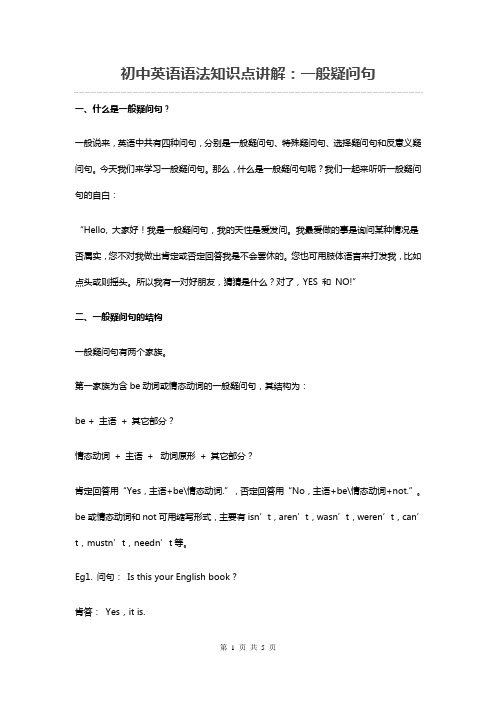
初中英语语法知识点讲解:一般疑问句一、什么是一般疑问句?一般说来,英语中共有四种问句,分别是一般疑问句、特殊疑问句、选择疑问句和反意义疑问句。
今天我们来学习一般疑问句。
那么,什么是一般疑问句呢?我们一起来听听一般疑问句的自白:“Hello, 大家好!我是一般疑问句,我的天性是爱发问。
我最爱做的事是询问某种情况是否属实,您不对我做出肯定或否定回答我是不会罢休的。
您也可用肢体语言来打发我,比如点头或则摇头。
所以我有一对好朋友,猜猜是什么?对了,YES 和NO!”二、一般疑问句的结构一般疑问句有两个家族。
第一家族为含be动词或情态动词的一般疑问句,其结构为:be + 主语+ 其它部分?情态动词+ 主语+ 动词原形+ 其它部分?肯定回答用“Yes,主语+be\情态动词.”,否定回答用“No,主语+be\情态动词+not.”。
be或情态动词和not可用缩写形式,主要有isn’t,aren’t,wasn’t,weren’t,can’t,mustn’t,needn’t等。
Eg1. 问句:Is this your English book?肯答:Yes,it is.否答:No,it isn`t.Eg2. 问句:Are these your English books?肯答:Yes,they are.否答:No,they aren’t.Eg3. 问句:Can you speak English?肯答:Yes,I can.否答:No,I can’t.注意例句1和例句2,在回答时必须将this\that与these\those分别变为it和they。
另一家族为含行为动词(或称为实义动词)的一般疑问句,其结构为:助动词+ 主语+ 动词原形+ 其它?肯定回答用“Yes, 主语+ do\does.”,否定回答用“No, 主语+don\does not.”。
助动词也常用缩写形式,主要有don’t,doesn’t,didn’t等。
【初中英语】初中英语知识点:一般疑问句
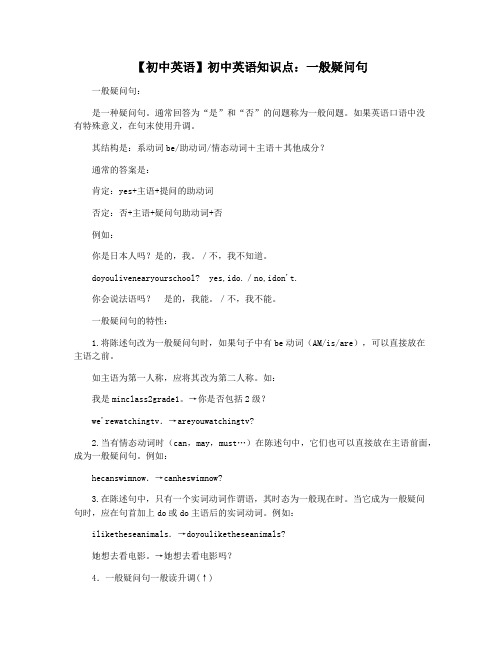
【初中英语】初中英语知识点:一般疑问句一般疑问句:是一种疑问句。
通常回答为“是”和“否”的问题称为一般问题。
如果英语口语中没有特殊意义,在句末使用升调。
其结构是:系动词be/助动词/情态动词+主语+其他成分?通常的答案是:肯定:yes+主语+提问的助动词否定:否+主语+疑问句助动词+否例如:你是日本人吗?是的,我。
/不,我不知道。
doyoulivenearyourschool? yes,ido./no,idon't.你会说法语吗?是的,我能。
/不,我不能。
一般疑问句的特性:1.将陈述句改为一般疑问句时,如果句子中有be动词(AM/is/are),可以直接放在主语之前。
如主语为第一人称,应将其改为第二人称。
如:我是minclass2grade1。
→你是否包括2级?we'rewatchingtv.→areyouwatchingtv?2.当有情态动词时(can,may,must…)在陈述句中,它们也可以直接放在主语前面,成为一般疑问句。
例如:hecanswimnow.→canheswimnow?3.在陈述句中,只有一个实词动词作谓语,其时态为一般现在时。
当它成为一般疑问句时,应在句首加上do或do主语后的实词动词。
例如:iliketheseanimals.→doyouliketheseanimals?她想去看电影。
→她想去看电影吗?4.一般疑问句一般读升调(↑)5.一般问题有时不需要回答是或否。
例如:aretheyintownnow?我想也是。
mayisithere?当然可以。
doeshelikesoccer?对不起,我不知道。
6.一般疑问句的第一单词总是虚词,读的时候要读轻声。
将陈述句转换为一般问题的技巧:根据一般疑问句不同的家族,可以用不同的方法将陈述句变为相应的一般疑问句。
1.第一类:包含be动词或情态动词的句子秘诀:一调二改三问号单音调:即把be或情态动词放在主语之前;二改:改换主语称谓,即将句中的主语i\my\mines\we\our\ours等。
初中英语疑问句知识点
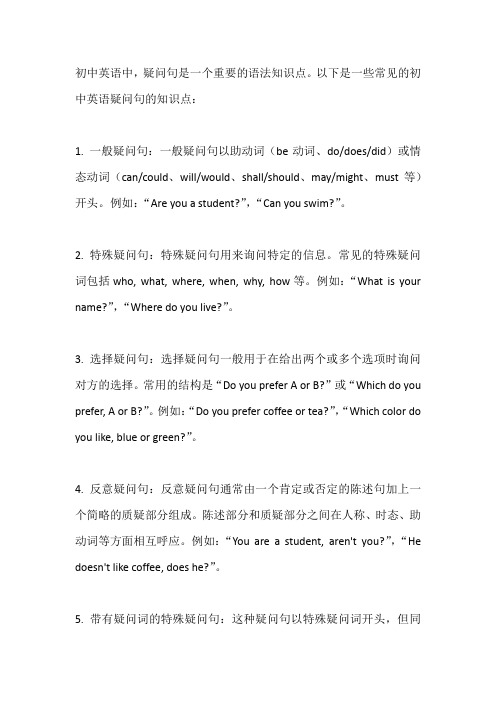
初中英语中,疑问句是一个重要的语法知识点。
以下是一些常见的初中英语疑问句的知识点:1. 一般疑问句:一般疑问句以助动词(be动词、do/does/did)或情态动词(can/could、will/would、shall/should、may/might、must等)开头。
例如:“Are you a student?”,“Can you swim?”。
2. 特殊疑问句:特殊疑问句用来询问特定的信息。
常见的特殊疑问词包括who, what, where, when, why, how等。
例如:“What is your name?”,“Where do you live?”。
3. 选择疑问句:选择疑问句一般用于在给出两个或多个选项时询问对方的选择。
常用的结构是“Do you prefer A or B?”或“Which do you prefer, A or B?”。
例如:“Do you prefer coffee or tea?”,“Which color do you like, blue or green?”。
4. 反意疑问句:反意疑问句通常由一个肯定或否定的陈述句加上一个简略的质疑部分组成。
陈述部分和质疑部分之间在人称、时态、助动词等方面相互呼应。
例如:“You are a student, aren't you?”,“He doesn't like coffee, does he?”。
5. 带有疑问词的特殊疑问句:这种疑问句以特殊疑问词开头,但同时也包含了一般疑问句的结构。
例如:“What time do you usually get up?”,“How often do you exercise?”。
学生在学习疑问句时需要注意以下几点:-疑问句的变换方式,如将陈述句转换为一般疑问句、特殊疑问句等;-特殊疑问词的使用及其不同的含义和用法;-语序的变化,特别是特殊疑问句中主语和谓语的位置变化。
初中英语一般疑问句

一般疑问句一、含有be动词的一般疑问句,通常把be动词调到句首。
例如:陈述句:They are in the swimming pool.一般疑问句:Are they in the swimming pool?注意:一般疑问句句末要用“?”。
二、含有情态动词的一般疑问句(can, may...),把情态动词调到句首。
例如:陈述句:He can drive a car.一般疑问句: Can he drive a car?三、含有have的一般疑问句,have译为“有”。
一般疑问句式有两种形式:1.把have/has调到句首。
例如:陈述句:Tommy has a computer.一般疑问句:Has Tommy/he a computer?2.加助动词do/does,第三人称单数用does,其他人称用do。
其句型为:Do/Does + 主语 + have...?例如上句可变为:Does Tommy have a computer?四、一般动词的一般疑问句,也要借助助动词do/does,第三人称单数用does,其余人称用do。
其句型为:Do/Does + 主语 + 动词原形+其它?陈述句:Amy speaks English.一般疑问句:Does Amy speak English?好了,知道了如何问话之后,我们来了解一下如何回答一般疑问句。
首先要有人称的改变。
当主语为名词时,在答语中要改成其相应的代词。
另外,答语有两种,肯定的回答(用yes)和否定的回答(用n o),否定式常用缩写形式。
现在还是让我们分句型一一说明。
一、一般疑问句含be动词时,用be动词回答,句末用句号。
例如:-Is Mary your sister?-Yes, she is. / No, she isn’t.(缩写)二、一般疑问句含有情态动词(can, may, should等)时,用情态动词回答。
例如:-May I come in?-Yes, you may. / No, you can’t.三、一般疑问句含有have(译为“有”)时,有两种回答方式。
初中英语疑问句一般疑问句特殊疑问句

1. I like English. Do you like English
2. Eddie played football. Did Eddie play football
一般疑问句的肯定回答、否定回答。
肯定回答:Yes,… +关键词。 否定回答:No,…+关键词+not.
8.I’ll bring it here in a minute.
How soon will you bring it here
Exercises :针对下列划线部分提问
• 1.We are going to Hainan Island. Where are you going
• 2.Chinese New Year this year is in February. When is Chinese New Year
Susan: _S_o_m__e_ of them are from Lianhua Supermarket and _s_o_m__e_ from Xixi shop.
Tom: Could you buy _s_o_m__e_ for me I also need s_o_m__e__
but I am very busy today.
想想还缺了哪个疑问词呢
Let’s see the family of “how”
1. I go to school by bus.
How do you go to school
2. She is twelve.
How old is she
3. Jim plays with his dog for about two hours on Sunday.
初中英语知识点归纳一般疑问句和特殊疑问句的变化

初中英语知识点归纳一般疑问句和特殊疑问句的变化一、一般疑问句一般疑问句是用来询问陈述句的真假、肯定或否定。
在构成一般疑问句时,只需要将句子的语序进行转换即可。
1. 一般疑问句的基本结构:肯定句:主语 + 助动词 do/does/did + 否定词 + 其他成分?否定句:主语 + 助动词 do/does/did + 其他成分?2. 一般疑问句的变化规则:2.1. 对于使用一般现在时的肯定句,将助动词 do/does 放在句子的最前面即可。
例如:原句:He likes playing basketball.疑问句:Does he like playing basketball?2.2. 对于使用一般过去时的肯定句,将助动词 did 放在句子的最前面即可。
例如:原句:She studied English yesterday.疑问句:Did she study English yesterday?2.3. 对于使用一般将来时的肯定句,将助动词 will 放在句子的最前面即可。
例如:原句:They will go to the park tomorrow.疑问句:Will they go to the park tomorrow?二、特殊疑问句特殊疑问句是用来询问事物的特点、原因、方式、时间、地点等具体信息。
在构成特殊疑问句时,需要将疑问词放在句子的最前面,然后按照一般疑问句的句子结构进行构建。
1. 特殊疑问词的使用:特殊疑问词通常用来引导特殊疑问句,常见的特殊疑问词有:what (什么),when(什么时候),where(在哪里),who(谁),which (哪个),why(为什么),how(怎么样)等。
例如:What is your name?When did you go to the cinema?Where is the library?Who is that girl?2. 特殊疑问句的变化规则:2.1. 特殊疑问词 what、who、which 作主语时,句子的谓语动词直接与特殊疑问词连用。
初中语法英语专题复习 一般疑问句和特殊疑问句(优质课件)

4、The model plane is under the sofa.
Is the model plane under the sofa?
Where is the model plane? 5、Her favorite subject is history.
Is this an old jacket? What's this?
2、My schoolbag is black and white. Is your schoolbag black and white?
What color is your schoolbag? 3、She likes playing sports.
技巧1、主语为I/we,转化成一般疑问句时,I/We要变为you, my,our 变为your。
技巧2、句子中没有实义动词时,选Is/ Are,有实义动词时 选Can/Do/Does 技巧3、肯定回答:Yes, +主语(通常是代词主格)+v.
不能用缩写形式Yes,it’s(x); Yes,it is.(v) 否定回答:No, +主语(通常是代词主格)+ v not.(常缩写形式).但am与 not不缩写.如:— Are you a student
一般疑问句和特殊疑问
1.Is this your pencil ? --Yes, it is. / No, it isn’t.
2.Can y用ouYplEaySb或askNetbOal来l? --Yes, I c回an.答/ N的o,问I ca句n’t. 3.Do常you是lik一e p般layi疑ng 问spo句rts?。
初中英语一般疑问句
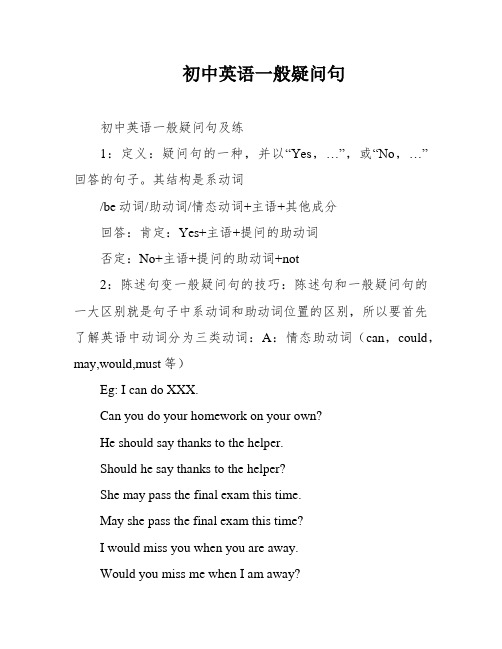
初中英语一般疑问句初中英语一般疑问句及练1:定义:疑问句的一种,并以“Yes,…”,或“No,…”回答的句子。
其结构是系动词/be动词/助动词/情态动词+主语+其他成分回答:肯定:Yes+主语+提问的助动词否定:No+主语+提问的助动词+not2:陈述句变一般疑问句的技巧:陈述句和一般疑问句的一大区别就是句子中系动词和助动词位置的区别,所以要首先了解英语中动词分为三类动词:A:情态助动词(can,could,may,would,must等)Eg: I can do XXX.Can you do your homework on your own?He should say thanks to the helper.Should he say thanks to the helper?She may pass the final exam this time.May she pass the final exam this time?I would miss you when you are away.Would you miss me when I am away?B:系动词(be,smell, taste,look,sound,seem等)Eg: XXX?XXX XXX?XXX look clear?C:行动动词即实意动词(动词自己就是来描绘行动的)Eg: I like to play basketball.Do you like to play basketball?3:XXX变普通疑问句的办法A:含be动词或神态动词的句子:秘诀:一调二改三问号一调:即把句中的be动词或者情态动词调到句子主语前二改:更换主语称呼,行将句中的主语IXXX品级一人称划分改为响应的第二人称you/yous/your等三问号:在句子开端加问号Eg; I am an English teacherAre you an English teacher?XXX?She is beautiful and niceIs she beautiful and nice?XXX?此类问答:肯定:Yes,主语+be动词或者情态动词否定:No,主语+be动词或者情态动词+not注意:be动词或者情态动词与not连用有缩写形式,主要有isn’t,aren’t,wasn’t,weren’t,can;t,mustn’t,needn’t等Eg: Is this your English book?一定:Yes, it is否定:No, it is not/it isn’tAre these your English book?肯定:Yes, they are否认:No, they are not/they XXX’tB:含行为动词或者实意动词的句子秘诀:一加二改三问号一加:即在句首加助动词do或者does(当主语是第三人称单数的时候),注意如果句子是过去时,does/do需变成did 二改:一把谓语动词改成原型。
初中英语疑问句句型分类知识点讲解
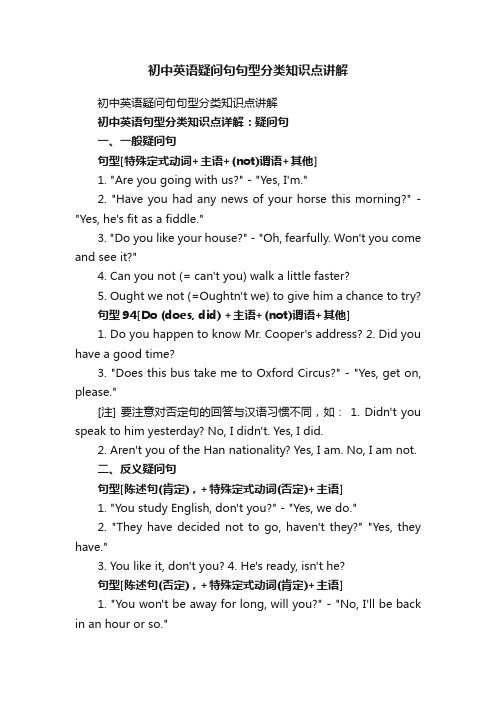
初中英语疑问句句型分类知识点讲解初中英语疑问句句型分类知识点讲解初中英语句型分类知识点详解:疑问句一、一般疑问句句型[特殊定式动词+主语+(not)谓语+其他]1. "Are you going with us?" - "Yes, I'm."2. "Have you had any news of your horse this morning?" - "Yes, he's fit as a fiddle."3. "Do you like your house?" - "Oh, fearfully. Won't you come and see it?"4. Can you not (= can't you) walk a little faster?5. Ought we not (=Oughtn't we) to give him a chance to try?句型94[Do (does, did) +主语+(not)谓语+其他]1. Do you happen to know Mr. Cooper's address?2. Did you have a good time?3. "Does this bus take me to Oxford Circus?" - "Yes, get on, please."[注] 要注意对否定句的回答与汉语习惯不同,如: 1. Didn't you speak to him yesterday? No, I didn't. Yes, I did.2. Aren't you of the Han nationality? Yes, I am. No, I am not.二、反义疑问句句型[陈述句(肯定),+特殊定式动词(否定)+主语]1. "You study English, don't you?" - "Yes, we do."2. "They have decided not to go, haven't they?" "Yes, they have."3. You like it, don't you?4. He's ready, isn't he?句型[陈述句(否定),+特殊定式动词(肯定)+主语]1. "You won't be away for long, will you?" - "No, I'll be back in an hour or so."2. "… I think I'll go into the green line. You couldn't give mea helping hand, could you, Mr. Snape?"3. "I'd like to go to Central Australia with you…. you h ave never been out of England, have you?"4. "He doesn't know anything about it, does he?" - "No, he doesn't.三、特指疑问句句型[疑问词(主语)+系词+表语]/ [疑问词(定语)+主语+行为动词+宾语]1. Who is there?2. Who gives your English lessons?3. What is in the box?4. Which is mine?5. Whose book is on the desk?6. How many students work in the workshop?7. What new products have been turned out in that factory?句型疑问词(表语/宾语/状语)+特殊定式动词+主语+行为动词…]1. Who is he?2. What is he?3. What is he like?4. What is it like?5. What kind of man is he?6. What day is today?7. What's the date today?8. What time is it now?9. How do you do?10. How are you getting along? (= how goes it with you? = how is life? = how is everything with you?11. How is your health? 12. How do you feel? 13. What's matter with you?14. Where are you going? 15. Where do you come from? 16. Where are you from?17. What's your nationality, please? 18. What family are you from?句型[疑问词+in the world/on earth/the devil/the deuce/ever等强调词语+其他]1. "What the deuce shall I write about?" - He thought.2. Whatin the world do you mean?3. Who on earth (in the world) told you that?4. Who the devil is he?5. What the deuce is the matter?6. What the dickens is it?7. Who ever wants this?四、选择疑问句句型[一般疑问句+or+一般疑问句]1. Shall we come to see you or will you come to see us?2. Are you from the South or from the North?3. Will he go on Monday or on Tuesday?4. Did you speak to them, or did the manager?5. Where's the bank? Should I go this way or that way?句型[特指疑问句,+A or B ?]1. "What would you like, Chinese or European food?" - "I don't mind one way or the other."2. Which would you rather have - steak or fish?3. Who will be your teacher, Mr. Brown or Mr. Cooper?4. Where did you spend your leave: in Shanghai or in Hangzhou?5. When will he go there, tomorrow or some other day?五、间接疑问句句型[适当的主语+疑问关联词+从句(正常语序)]1. I'd like to know how old you are.2. He inquired how it was done.3. "Guess how old I am." - "I'd say you're about twenty-three."4. I ask you what you want.5. Please advise me which book I should read first.6. Tell me why it is so important.句型[适当的`主语+if/whether+从句(正常语序)]1. I sometimes ask myself the question whether it was worththe effort.2. I ask you whether it is true or not.3. She asked if I had slept.4. Tell me whether you like it.5. He visited us next day and asked if we had got home safe.6. She inquired if he liked the post.六、双重疑问句句型一般疑问句+疑问关联词+从句(正常语序)]1. Can you tell me where he has gone?2. Have you any idea where he lives?3. May I ask you then what you would advise me to do?4. Do you know who lives here?5. Do you know when he was born?句型[疑问词+do you think/did you say/can you guess/do you suppose+其他(正常语序)]1. What will be the result, do you think?2. "How old were you then, Clyde, did you say?" "Between seventeen and eighteen."3. When do you think the meeting will be held?4. How many books, can you guess, did he buy the other day?5. What do you suppose he's hanging around here?七、修辞疑问句句型[陈述句(肯定)+反问句(肯定)]1. We're old friends, not strangers, right?2. So you've been abroad, have you?3. She's a sweet little girl, is she?4. The land reform has just reached the stage of deciding everyone's class status, so you come sucking around, do you?句型[疑问词+should+主语+动词原形+其他]1. Who should I see but my own brother?2. Who should there be?3. Why should the door be locked?4. Who/Whom should I see in the courtyard but Mr. Smith?5. "Where is Jane?" - "How should I know?"6. Why should he be angry with me?句型[Oh,/So+陈述句+反问句]1. Oh, he's here now, is he?2. Oh, you told him all about it, did you?3. So you've the luggage taken to the station, have you?4. So you're going abroad, are you?八、回响疑问句句型[A:陈述句+B:疑问句(重复A句中的部分)]1. A: I didn't like that meal. B: You didn't like it? (怀疑)2. "I'm tired." - "Are you?" (怀疑)3. A: The Browns are emigrating. B: Emigrating? (惊讶)4. A: It cost sixty dollars. B: How much did it cost? (惊讶)5. A: Switch the light off, please. B: Switch the light off, you say? / Switch what off? (反对)句型[A: 疑问句+B: 重述性疑问句]1. A: What do you think of the picture? B: What do I think of it? (怀疑)2. A: How did you enjoy the carnival? B: How did I enjoy what? (要求)3. A: How did you enjoy your holidays? B: How did I enjoy my holidays? (考虑回答)4. A: Have you borrowed my pen? B: (Have I) Borrowed your pen? (反驳)九、陈述式疑问句句型[任何陈述形式的疑问句(词序不变)]1. My friend's here?2. You wouldn't see me left here alone?3. "You followed us, then?" - "What's that to you? ..." saidJones, "Go to the devil!"4. A two million dollar building, you can't touch the walls?5. "You are not ill?" was the question put, "A little sick," replied Miss Keldar.句型[…疑问词(在剧中任何位置上)]1. "You use that position as a favorite to insult a gentleman." - "To insult a what?" said Steerforth.2. Five times what number makes twenty?3. I asked the carrier, "Are we going all the way there?" - "All the way where?" asked the carrier4. You're twenty-what (odd) this year?5. He's your who?6. Your who is a steel-worker?7. How old a child could draw this? 8. He is your son of what number?。
初中英语语法知识点讲解一般疑问句

初中英语语法知识点讲解一般疑问句一般疑问句是英语中常用的一种问句形式,用来提出对一些陈述句的疑问或询问事实、情况。
一般疑问句的特点是在句首使用助动词或情态动词来完成疑问句的构建。
以下是一般疑问句的常见知识点:1.助动词的使用:一般现在时:do / does一般过去时:did一般将来时:will现在进行时:am / is / are过去进行时:was / were例如:- Do you like pizza? (你喜欢披萨吗?)- Did she go to the party? (她去参加派对了吗?)- Will they visit their grandparents tomorrow? (他们明天会去拜访祖父母吗?)- Is he playing soccer now? (他现在在踢足球吗?)- Were you studying yesterday? (你昨天在学习吗?)2.情态动词的使用:can / could / may / might / must / should / would / shall / will例如:- Can you swim? (你会游泳吗?)- Should we go to the concert tonight? (我们今晚应该去听音乐会吗?)- Would you like some tea? (你想喝些茶吗?)- Must she finish her homework before going out? (她必须在出门前完成作业吗?)3.特殊疑问词的使用:在构建一般疑问句时,如果需要询问特定信息,常会使用特殊疑问词来引导。
常见的特殊疑问词有:what、where、when、why、how、who等。
例如:- Where is the post office? (邮局在哪里?)- When did they arrive at the airport? (他们什么时候到达机场的?)- Why are you crying? (你为什么哭?)- How do you get to school? (你怎么去学校的?)- Who is your favorite singer? (你最喜欢的歌手是谁?)。
初中英语一般疑问句和特殊疑问句讲解及练习

初中英语一般疑问句和特殊疑问句知识一般疑问句1.定义:用be或助动词或情态动词置于句首,并以“Yes,…”,或“No,…”或相当于yes / no回答的问句称为一般疑问句.2. 含系动词be的一般疑问句的构成:具体地说,am 只能跟在第一人称的单数I 后面,are 搭配you, 不管是单数还是复数,is跟在第三人称单数he, she 后面Eg:I'm in Class 2, Grade 1. →Are you in Class 2, Grade 1? (如遇第一人称,最好将其置换成第二人称)It's a map of China. →Is it a map of China? 这是一幅中国地图吗?be 或have(有)置于句首来表达疑问,eg:Am I wrong again? (我又错了?)3. 含情态动词的一般疑问句的构成一般疑问句面前人人平等:情态动词与am / is / are一样,也可直接将它们提至主语前,所以问题迎刃而解了。
如:I can spell it. →Can you spell it? 你会拼写它吗?Shall I call a taxi for you ?Will you do that for her?Can she drive?4. 含实义动词的一般疑问句的构成含实义动词的一般疑问句的构成稍微有点讲究,要在句首加助动词do或者does(当主语为第三人称单数,并要将谓语动词变回原形),有时陈述句中的some还要变作any等。
如:She lives in Beijing. →Does she live in Beijing?I like English. →Do you like English?There are some books on my desk.→Are there any books on your desk?5. 一般疑问句的应答用yes / no回答,并怎么问怎么答(句首为情态动词/am / is / are还是do /does),简略回答时要注意缩写(否定的n't)和采用相应的人称代词以避免重复:即"Yes,主语(代词)+情态动词或am / is / are或do / does."表示肯定;"No,主语(代词)+情态动词或am / is / are或者do / does not(n't)."表示否定。
初中英语四种疑问句的用法归纳.doc

初中英语四种疑问句的用法归纳初中英语四种疑问句的用法归纳一、学习一般疑问句的五个要点就全句提出问题,希望对方给予肯定或否定答复的问句,叫做一般疑问句。
回答时要用Yes或No来开头,句末用问号,朗读时用升调。
(一)、一般疑问句的基本结构1. 如果谓语中有情态动词、助动词或be,将这些词移到主语之前。
如:Eg: Can you dance? 你会跳舞吗?Will he go there tomorrow? 他明天去那里?Are you a student? 你是学生吗?2. 如果谓语中没有情态动词、助动词或be,就在主语前加助动词do(does、did) ,原来的动词都用原形。
如:Eg: Do you like English? 你喜欢英语吗?Does your brother like English? 你的兄弟喜欢英语吗?Did you sleep well last night? 你昨晚睡得好吗?注:have做助动词时,将其移至主语前;作“有”解时也可以将其移至主语前;不是作“有”解的为行为动词时,其疑问式和其他行为动词一样要在主语前加do(does、did) 。
如:Eg: Has he gone to England? 他到英国去了?Have you (=Do you have) a car? 你有汽车吗?Do you have lunch at school? 你是在学校吃中饭的吗?(二)、一般疑问句的简略回答Eg: —Can you swim? 你会游泳吗?—Yes, I can. (No, I can’t) 会。
(不会)—Have you finished your work? 你工作做完了吗?—Yes, I have. (No, I haven’t. ) 做完了。
(还没有。
)—Is this your pen? 这是你的钢笔吗??—Yes, it is. (No, it isn’t) 是的。
初中英语语法:一般疑问句
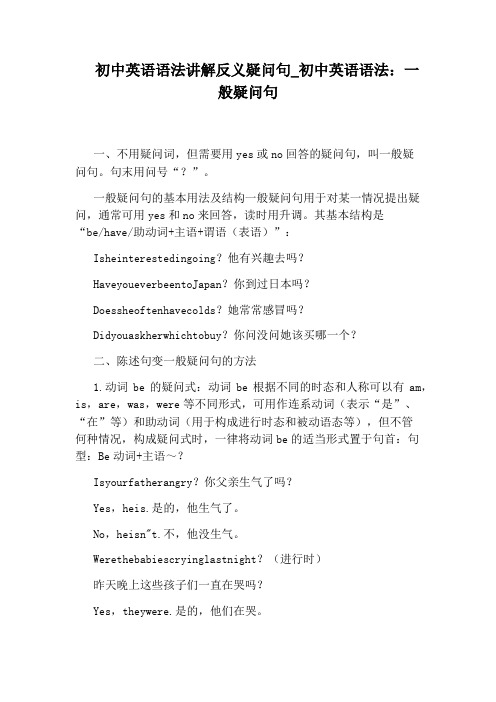
初中英语语法讲解反义疑问句_初中英语语法:一般疑问句一、不用疑问词,但需要用yes或no回答的疑问句,叫一般疑问句。
句末用问号“?”。
一般疑问句的基本用法及结构一般疑问句用于对某一情况提出疑问,通常可用yes和no来回答,读时用升调。
其基本结构是“be/have/助动词+主语+谓语(表语)”:Isheinterestedingoing?他有兴趣去吗?HaveyoueverbeentoJapan?你到过日本吗?Doessheoftenhavecolds?她常常感冒吗?Didyouaskherwhichtobuy?你问没问她该买哪一个?二、陈述句变一般疑问句的方法1.动词be的疑问式:动词be根据不同的时态和人称可以有am,is,are,was,were等不同形式,可用作连系动词(表示“是”、“在”等)和助动词(用于构成进行时态和被动语态等),但不管何种情况,构成疑问式时,一律将动词be的适当形式置于句首:句型:Be动词+主语~?Isyourfatherangry?你父亲生气了吗?Yes,heis.是的,他生气了。
No,heisn"t.不,他没生气。
Werethebabiescryinglastnight?(进行时)昨天晚上这些孩子们一直在哭吗?Yes,theywere.是的,他们在哭。
No,theyweren"t.不,他们没哭。
IsEnglishspokenallovertheworld?(被动语态)全世界都说英语吗?Yes,itis.是的。
No,itisn"t.不。
2.动词have的疑问式:动词have根据不同的时态和人称可以有have,has,had等形式,可以用作实意动词和助动词,分以下情况讨论:①用作实意动词表示状态,如表示拥有、患病或用于haveto表示“必须”等,在构成构成式时可以直接将have,has,had置于句首,也可根据情况在句首使用do,does,did:Doeshehave[Hashe]anythingtosay?他有什么话要说吗?Doyouhave[Haveyou]toleavesosoon?你必须这么早走吗?Didyouhave[Hadyou]anyfriendsthen?他当时有朋友吗?②用作实意动词表示动作,如表示“吃(=eat)”、“喝(=drink)”、“拿(=take)”、“收到(=receive)”、“度过(=spend)”等,构成疑问式时不能将have提前至句首,而应在句首使用do,does,did:Doeshehavebreakfastathome?他在家吃早餐吗?Didyouhaveagoodtimeattheparty?你在晚会上玩得高兴吗?③完成时的一般疑问句句型:Have(Has)+主语+动词的过去分词+~?Haveyouknownhersinceyourchildhood?你从童年就认识她吗?Yes,Ihave.是的。
初中英语疑问句分类及应用知识点归纳
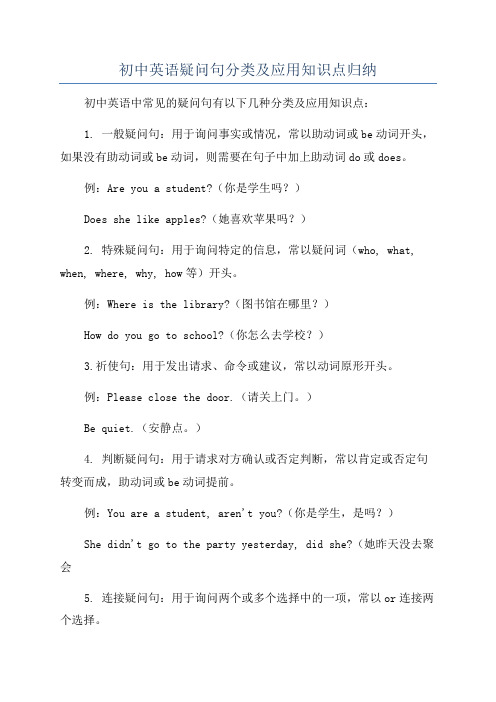
初中英语疑问句分类及应用知识点归纳初中英语中常见的疑问句有以下几种分类及应用知识点:
1. 一般疑问句:用于询问事实或情况,常以助动词或be动词开头,如果没有助动词或be动词,则需要在句子中加上助动词do或does。
例:Are you a student?(你是学生吗?)
Does she like apples?(她喜欢苹果吗?)
2. 特殊疑问句:用于询问特定的信息,常以疑问词(who, what, when, where, why, how等)开头。
例:Where is the library?(图书馆在哪里?)
How do you go to school?(你怎么去学校?)
3.祈使句:用于发出请求、命令或建议,常以动词原形开头。
例:Please close the door.(请关上门。
)
Be quiet.(安静点。
)
4. 判断疑问句:用于请求对方确认或否定判断,常以肯定或否定句转变而成,助动词或be动词提前。
例:You are a student, aren't you?(你是学生,是吗?)
She didn't go to the party yesterday, did she?(她昨天没去聚会
5. 连接疑问句:用于询问两个或多个选择中的一项,常以or连接两个选择。
例:Do you like apples or oranges?(你喜欢苹果还是橙子?)。
疑问句知识点详解(初中英语专项复习)4

疑问句知识点详解(初中英语专项复习)考向一:一般疑问句英语中的疑问句分为一般疑问句、特殊疑问句、选择疑问句和反意疑问句四种。
所谓一般疑问句,就是可以用yes或no来回答的疑问句。
1. 肯定形式的一般疑问句此类一般疑问句的结构为"连系动词be/助动词/情态动词+ 主语+ 动词原形+ 其他? "。
—Is he a good student? 他是一个好学生吗?—Yes, he is. 是的,他是。
/ No, he isn’t. 不,他不是。
—Does he go to school by bike? 他骑自行车去上学吗?—Yes, he does. 是的,他骑。
/ No, he doesn’t. 不,他不骑。
【典例】— Are there any notebooks on COVID-19 (新冠肺炎病毒) in your school?— _______. They tell us how to protect ourselves in this big event.A. Yes, they areB. Yes, there areC. Yes, there isD. Yes, it is【答案】B【解析】考查there be句型。
句意:——你们学校有新冠肺炎病毒的笔记本吗?——是的,有。
它们告诉我们在这个大事件中如何保护自己。
Are there…句式的答语:Yes, there are. /No, there aren’t. 故选B。
2. 否定形式的一般疑问句此类一般疑问句主要表示反问或惊讶,通常在连系动词be,情态动词或助动词后加not的缩略式n’t,并放在句首。
—Aren’t you a writer? 难道你不是作家吗?—No, I’m not. 是的,我不是。
【注意】在这样的句子中,要注意句子的翻译,yes翻译成"不",no翻译成"是的"。
【典例】—What a fine day!Let’s go for a picnic, _______ ?—Sounds like a good idea.A. shall weB. don’t weC. can we【答案】A【解析】考查反意疑问句。
- 1、下载文档前请自行甄别文档内容的完整性,平台不提供额外的编辑、内容补充、找答案等附加服务。
- 2、"仅部分预览"的文档,不可在线预览部分如存在完整性等问题,可反馈申请退款(可完整预览的文档不适用该条件!)。
- 3、如文档侵犯您的权益,请联系客服反馈,我们会尽快为您处理(人工客服工作时间:9:00-18:30)。
一般疑问句
一、含有be动词的一般疑问句,通常把be动词调到句首。
例如:
陈述句:They are in the swimming pool.
一般疑问句:Are they in the swimming pool?
注意:一般疑问句句末要用“?”。
二、含有情态动词的一般疑问句(can, may...),把情态动词调到句首。
例如:
陈述句:He can drive a car.
一般疑问句: Can he drive a car?
三、含有have的一般疑问句,have译为“有”。
一般疑问句式有两种形式:
1.把have/has调到句首。
例如:
陈述句:Tommy has a computer.
一般疑问句:Has Tommy/he a computer?
2.加助动词do/does,第三人称单数用does,其他人称用do。
其句型为:Do/Does + 主
语 + have...?例如上句可变为:
Does Tommy have a computer?
四、一般动词的一般疑问句,也要借助助动词do/does,第三人称单数用does,其余人称用do。
其句型为:Do/Does + 主语 + 动词原形+其它?
陈述句:Amy speaks English.
一般疑问句:Does Amy speak English?
好了,知道了如何问话之后,我们来了解一下如何回答一般疑问句。
首先要有人称的改变。
当主语为名词时,在答语中要改成其相应的代词。
另外,答语有两种,肯定的回答(用y es)和否定的回答(用no),否定式常用缩写形式。
现在还是让我们分句型一一说明。
一、一般疑问句含be动词时,用be动词回答,句末用句号。
例如:
-Is Mary your sister?
-Yes, she is. / No, she isn’t.(缩写)
二、一般疑问句含有情态动词(can, may, should等)时,用情态动词回答。
例如:
-May I come in?
-Yes, you may. / No, you can’t.
三、一般疑问句含有have(译为“有”)时,有两种回答方式。
1.直接用have/has回答。
例如:
-Have they any pictures?
-Yes, they have. / No, they haven’t.
2.用助动词do/does回答。
例如:
-Does Millie smoke?
-Yes, she does. / No, she doesn’t.
四、一般动词的一般疑问句回答时也用助动词。
例如:
-Do the workers live in London?
-Yes, they do. / No, they don’t.
一、一般疑问句
一般疑问句也可称为“yes /no questions”,因这种问句通常用yes /no来回答,相当于汉语中的“……吗?”其语序是:系动词be /助动词/情态动词+主语+其他成分?如:Are you from Japan?
Yes I am./No I'm not.
Is her sister doing her homework now?
Yes she is./No she isn't.
Does he work in a bank?
Yes he does./No he doesn't.
Do you live near your school?
Yes I do./No I don't.
Can you speak French?
Yes I can./No I can't.
May I go home now?
Yes you may./No you mustn't.
注意:
1.将陈述句变为一般疑问句时,如句中有be 动词(am is are …)时,可直接将它们提至主语前。
如主语为第一人称,应将其改为第二人称。
如:
I'm in Class 2Grade 1.→
Are you in Class 2Grade 1?
We're watching TV.→
Are you watching TV?
2.陈述句中有情态动词(can may must …)时,也可直接将它们提至主语前,即可成为一般疑问句。
如:
He can swim now.→
Can he swim now?
The children may come with us.→ May the children come with us?
3.陈述句中只有一个实义动词作谓语且其时态为一般现在时,变为一般疑问句时要在句首加do或does 主语后的实义动词用原形。
如:
I like these animals.→
Do you like these animals?
She wants to go to the movies.→ Does she want to go to the movies?
4.一般疑问句一般读升调(↑)
5.一般疑问句有时不用yes或no 回答。
如:
Are they in town now?
I think so.
May I sit here?
Certainly.
Does he like soccer?
Sorry I don't know.。
